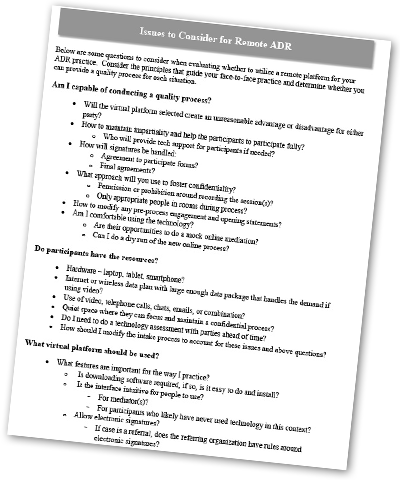Here are some questions to consider when evaluating whether to utilize a remote platform for your ADR practice. Consider the principles that guide your face-to-face practice and determine whether you can provide a quality process for each situation.
Am I capable of conducting a quality process?
- Will the virtual platform selected create an unreasonable advantage or disadvantage for either party?
- How to maintain impartiality and help the participants to participate fully?
- Who will provide tech support for participants if needed?
- How will signatures be handled:
- Agreement to participate forms?
- Final agreements?
- What approach will you use to foster confidentiality?
- Permission or prohibition around recording the session(s)?
- Only appropriate people in rooms during process?
- How to modify any pre-process engagement and opening statements?
- Am I comfortable using the technology?
- Are their opportunities to do a mock online mediation?
- Can I do a dry run of the new online process?
Do participants have the resources?
- Hardware – laptop, tablet, smartphone?
- Internet or wireless data plan with large enough data package that handles the demand if using video?
- Use of video, telephone calls, chats, emails, or combination?
- Quiet space where they can focus and maintain a confidential process?
- Do I need to do a technology assessment with parties ahead of time?
- How should I modify the intake process to account for these issues and the above questions?
What virtual platform should be used?
- What features are important for the way I practice?
- Is downloading software required, if so, is it easy to do and install?
- Is the interface intuitive for people to use?
- For mediator(s)?
- For participants who likely have never used technology in this context?
- Allow electronic signatures?
- If case is a referral, does the referring organization have rules around electronic signatures?
- Allow sharing of documents confidentially?
- Can people highlight or point to specifics in documents being shared onscreen?
- Shared whiteboard for mediator to use or space to jointly draft documents?
- Allow video that is confidential?
- Quality of video?
- Allow private sessions for party and attorney to communicate and/or caucusing – how seamless/easy is this for the mediator and parties?
- Have a “waiting room” which allows people to log into the platform, but they can’t join the session until the host brings them into the session.
- Allow emailing from within the system to track all communications with parties?
- Backup system such as a second computer serving as co-host or chat feature if the primary computer goes down or if the video system fails?
- Allow parties to negotiate together at the same time or allow parties to log on when convenient and have an asynchronous process?
- Privacy
- Allow for unique login password for each user?
- Protect confidential information of parties?
- Are emails, phone numbers, or other contact information public or private
- Do software providers have a clear privacy policy since video and documents are likely on their servers?
- What level of encryption do you and your parties need?
- Cost of system?
- Works across systems?
- PC, Mac?
- Smartphones?
- Apple, Android, others
- Can people call in from a landline if they can’t do video?
- System allows online payments by parties for services?

